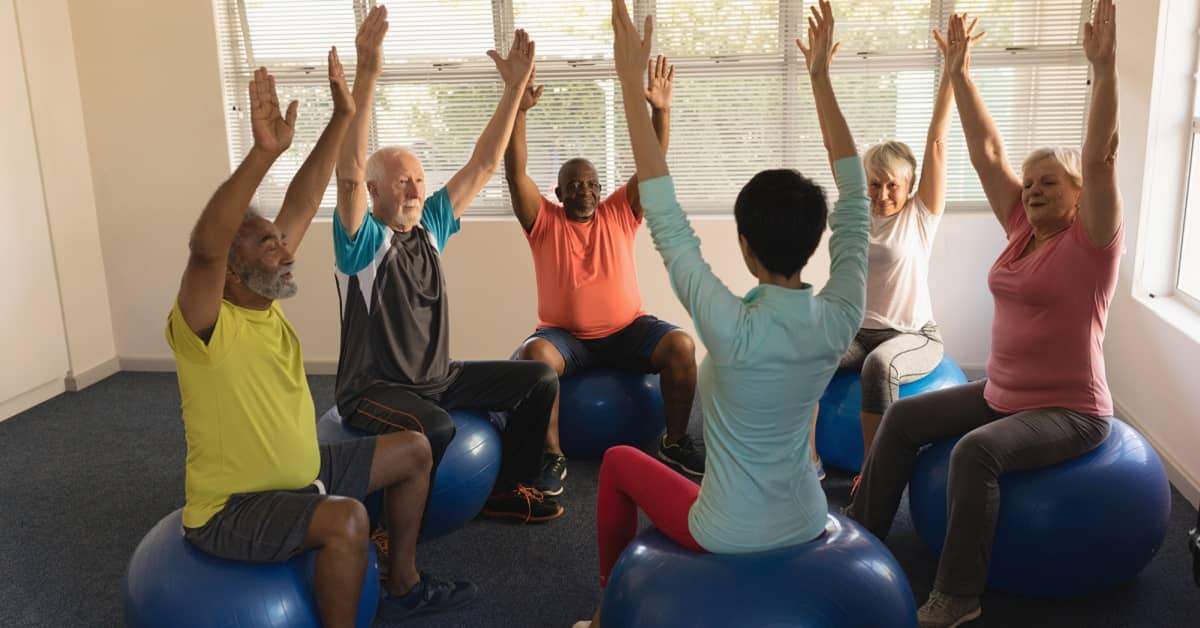
Imagine a world where regaining lost functions and sparking cognitive revival is as simple as moving your arms while sitting in a chair. Sounds too good to be true? A revolutionary exercise program is proving otherwise. Designed specifically for dementia patients, this groundbreaking routine is transforming lives by improving memory, mobility, and overall mental well-being. Could these unique movements hold the key to unlocking the brain’s hidden potential? Read on to uncover the fascinating science behind this innovative approach.
Key Takeaways
-
Bilateral Asymmetry Enhances Cognitive Function: The Love to Move program utilizes non-mirroring movements on each side of the body, stimulating different areas of the brain and creating new neural pathways, which helps improve cognitive reserve.
-
Regaining Lost Abilities: Many participants with dementia have regained essential skills such as self-feeding, social engagement, and even mobility, proving that brain plasticity can still be harnessed at any age.
-
Accessible and Free for Everyone: Initially designed for in-person classes, Love to Move is now available online, making it easy for individuals and caregivers to incorporate these life-changing exercises from the comfort of home.
Mind in Balance: How Brain Asymmetry Enhances Cognition
To stay mentally fit, you need to stay physically fit. But for those suffering from dementia, aerobic exercise and strength training may be beyond them. Fortunately, an easy exercise program is now available that fits the bill for just about any health situation.
This new exercise program is not only transforming the physical lives of many dementia patients, but it's also improving their cognitive function in amazing ways.
Best of all, you can perform these exercises while you sit on your sofa.
The Value of Bilateral Asymmetry
When Patrick Bonner, head of the British Gymnastics Foundation, visited Japan four years ago, he witnessed a chair-based exercise program that was changing people’s lives. The results were so remarkable he felt compelled to introduce it to the West.
"It isn’t just exercise," he explained, "it’s unique."
There are several key components to the program, called Love to Move, but the unique aspect of it, and one of the main reasons it's thought to work so well, is that it uses “bilaterally asymmetrical movement patterns.”
That’s a mouthful, but it just means body movements on the left side do not mirror body movements on the right side. For instance, one of the exercises is called "drawing sticks and circles" where the left arm moves up and down while the right arm moves in a circle.
Mr. Bonner explains why these types of exercise are important: "They do something quite amazing in the brain for all adults, whether they have dementia or not.
"The science that lies behind the specially designed brain-training exercises has a transformational effect... as new pathways are created by the brain."
Mr. Bonner goes on to say, "They require both sides of the brain to work independently and individually. Without you realizing it, your brain has to work much harder and the effect of that is to increase cognitive reserve."
To my longtime readers who have a really good memory, the principle behind Love to Move is not entirely new. Years ago I reported that a righthanded person could improve cognition by forcing himself to do things with his left hand. Lefthanded people can achieve the same result by just doing the reverse.
This builds cognitive reserve, which makes the brain more resilient, utilizes more neurons, and enables everyday tasks to be processed more easily. Building cognitive reserve is believed to reduce the risk of dementia.
There are many other ways to build it – cognitive reserve is believed to be the reason people who are more educated or “use their heads more” have a much lower incidence of dementia.
But if you didn’t go to college, or you’re not a chess or bridge champion, fear not: Love to Move can cause your brain to spark up.
Functions Lost are Regained
The simple Love to Move exercises have a profound effect on people with dementia.
Kim Hall, the lead coach, remarked that she "thought the program would, at best, just be able to slow down the rate of dementia progression. But we have found some participants are regaining functions thought to have been lost."
For example, a wheelchair user who needed to be pushed started wheeling himself after beginning the Love to Move program.
Then there’s Hazel, age 97, who was reclusive, couldn't concentrate, stopped talking, and struggled to feed herself. Now she chats away, reads better, can pick up a hot cup of tea safely, and can knit. "When I went into the care home I was gone," Hazel said, "there was nothing left inside me. Then I started doing Love to Move. I can feed myself. I can knit. I feel like I am a person again."
Another participant had lived with dementia for two years. She was no longer able to use a coffee machine. After just two weeks of performing the exercises for 20 minutes a day, and with no other changes in her life, she was able to recall the complex sequence of actions needed to operate the machine and make herself a fresh cup.
Meanwhile, Ricky, a 77-year-old dementia patient, was confused, depressed, and anxious with no confidence. His daughter describes what happened next. “We tried the class on the premise that he would be able to sit and do a few exercises that weren’t that complex on the face of it. “Slowly, it stimulated him in so many ways. His cognitive function improved, and so did his appetite to be with other people. And then, as he got more comfortable, he would help to make the teas and coffees and put the chairs out. It gave him a sense of purpose."
Now Available Online
An England-based charity called Age UK conducted its research on the Love to Move program and the findings are exciting, to say the least. They reported that 86 percent of dementia sufferers socialized better; 71 percent initiated more conversations; 93 percent were happier, felt more settled, and enjoyed improved eye contact; while 64 percent slept better. Most importantly, every single participant of the Love to Move program in the study was easier to connect with, calmer, and more relaxed. The charity also found two out of three participants had noticeable improvements in their physical function. They described the program as having "a demonstrable benefit in the physical, emotional, and cognitive aspects of older people." Love to Move was designed to be taught in person, but since the coronavirus pandemic, the program is available online for free. You or a loved one can sit in front of your computer and follow instructor Kim Hall from the comfort of your own home or care facility.
Other Exercises to Help
For those with dementia or other limitations, engaging in simple, targeted hand exercises can offer cognitive benefits without the physical strain of traditional workouts. Fortunately, an accessible and adaptable exercise program now exists, making it possible for individuals of all abilities to support their brain health safely and effectively.
Summary
Staying physically active is key to mental fitness, but for dementia patients, traditional workouts may be too challenging. Enter Love to Move, a specially designed chair-based exercise program that utilizes bilateral asymmetry to stimulate brain function and enhance cognitive reserve. Developed by the British Gymnastics Foundation and inspired by a successful Japanese method, this routine has shown remarkable results—helping individuals regain lost abilities, improve social engagement, and boost overall well-being. The best part? It’s accessible to everyone, available online, and completely free. If you or a loved one is struggling with dementia, this groundbreaking program could be a game-changer.
Frequently Asked Questions
What is the Love to Move program?
Love to Move is a chair-based exercise program that uses bilateral asymmetry to enhance brain function and improve cognitive and physical abilities in dementia patients.How does bilateral asymmetry help with cognitive function?
Bilateral asymmetry engages different sides of the brain independently, creating new neural pathways that boost cognitive reserve, memory, and motor skills.Who can benefit from this program?
While designed for dementia patients, Love to Move is beneficial for anyone looking to improve brain function, coordination, and mobility, including older adults and individuals with limited movement.Is the program available online?
Yes! Love to Move is now accessible online for free, allowing participants to follow along with instructor-led videos from home or care facilities.How soon can participants see the results?
Many individuals report noticeable improvements in cognition, social engagement, and mobility within just a few weeks of regular practice, with continued benefits over time.- Teri, L., Logsdon, R. G., & McCurry, S. M. (2008). Exercise interventions for dementia and cognitive impairment: the Seattle Protocols. The journal of nutrition, health & aging, 12(6), 391–394.
- National Institute on Aging. (2024, July 8). Adapting activities for people with Alzheimer's disease. National Institutes of Health
